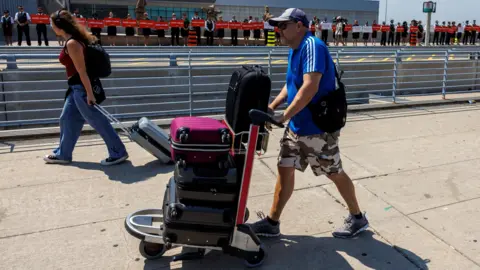Air Canada is currently facing significant disruptions as it has suspended “all operations” due to a strike initiated by its flight attendants. This labor action began early on Saturday after the attendants issued a 72-hour strike notice earlier in the week, following a breakdown in contract negotiations. The Canadian Union of Public Employees (CUPE), representing about 10,000 attendants, reported that the airline failed to address critical concerns such as wages and issues related to unpaid work. As a result, the strike commenced shortly after midnight, leading to widespread flight cancellations and delays.
In response to the unfolding situation, Air Canada anticipated the cancellation of approximately 500 flights by Friday, affecting around 100,000 passengers. The airline implemented a halt on its Air Canada and Air Canada Rouge services soon after the strike began. Canadian authorities intervened promptly, invoking their powers to mandate binding arbitration between the airline and the union in a bid to minimize the disruption of travel services and mitigate potential economic fallout.
The current strike has repercussions for countless travelers, particularly considering Air Canada operates in 64 countries with a fleet of 259 aircraft. Although the Air Canada Express flights will continue unaffected, which account for about 20% of the airline’s daily passengers, a complete shutdown could impact around 130,000 daily customers including 25,000 Canadians.
The conflict stems from ongoing negotiations between CUPE and Air Canada, which have reportedly been in discussion for over eight months. The airline proposed a 38% total compensation increase over four years, including a substantial raise of 25% in the first year. However, the union countered that this offer did not align with inflation rates, market value, or even the minimum wage threshold. As a result, they framed the proposed increase as effectively a pay cut, as it would leave attendants unpaid for numerous hours, particularly during critical operational times like airport waiting or boarding assistance.
In light of these tensions, the Canadian government, represented by Labour Minister Patty Hajdu, stepped in to compel both parties into binding arbitration by invoking Section 107 of the Canada Labour Code. Hajdu noted that despite governmental support, the involved parties could not reach an agreement in a timely fashion, necessitating this decision to maintain industrial peace and safeguard the interests of Canadians. Meanwhile, CUPE has criticized the government’s involvement, alleging a violation of their charter rights and expressing concern that enforced arbitration could exacerbate rather than resolve existing issues.
The historical backdrop of labor disputes involving Air Canada adds context to the current situation. Past strikes, such as the notable 1998 strike which lasted 13 days and cost the airline C$133 million, underscore the potential for significant disruption. The federal government has frequently intervened in labor disputes at Air Canada in recent years, often blocking strikes and imposing contracts to ensure productivity continues. This current dispute marks a pivotal moment as the first strike by the airline’s flight attendants since 1985 looms on the horizon.
As passengers struggle to navigate this turmoil, Air Canada has advised those affected to remain updated regarding their flight schedules. The airline emphasized that they are committed to informing passengers of any cancellations or delays and promises full refunds for canceled flights. Additionally, alternative travel options through partnerships with other carriers are being arranged to accommodate stranded travelers.
In conclusion, the Air Canada flight attendants’ strike reflects deeper labor concerns that require immediate attention to prevent extended disruptions in travel and economic activities throughout Canada. Both the union and the airline must now confront the overarching issues that brought about this strike in the first place. Passengers are urged to stay informed and consider other travel arrangements while the situation develops.












